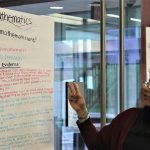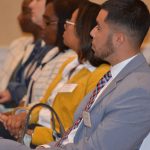Every year just before Thanksgiving, UConn Baseball Head Coach Jim Penders leads a run up the steep hill at New Storrs Cemetery on the northern side of campus. The destination is the Storrs family grave, which sits on top of the hill – always with a clear view of Storrs Congregational Church, as stipulated by the Storrs brothers’ will.
“In order to reach the goal of a more diverse student population that is equitably served, it’s not enough to offer admission to a more diverse range of students — they must also be provided a network of programs and resources that supports their needs,” says Kailee Himes.
Meet pre-service teacher Tamashi Hettiarachchi. She shares with us her experiences & resources she finds helpful in learning how to teach NGSS. Her passion and energy is contagious
“I think it should alarm us in the sense that American children – and more specifically Connecticut children – are not nearly as physically fit,” VanHeest said. “Just like reading and math scores, this matters.
Green said the most obvious issue for AUB was Title VI of the Civil Rights Act of 1964, which states that any entity that takes federal funds, including universities, may not discriminate on the basis of race, color or national origin.
In recommending the “schoolwide-enrichment model,” SDAG was promoting an alternative method for teaching gifted students. The theory was developed by Joseph S. Renzulli and Sally Reis of the National Research Center on the Gifted and Talented at the University of Connecticut. The theory has a “broadened conception of giftedness,” and “the centerpiece of the model is the development of differentiated learning experiences that take into consideration each student’s abilities, interests, learning styles, and preferred styles of expression,” Renzulli and Reis write. This enables the development of “talents in all children.”
Congratulations to our Neag School alumni, faculty, staff, and students on their continued accomplishments inside and outside the classroom. If you have an accolade to share, we want to hear from you! Please send any news items and story ideas to neag-communications@uconn.edu.
More than 60 Neag School alums, students, faculty, and administrators, along with education professionals from across Connecticut, gathered last month for an evening of networking, followed by a panel discussion at the Darien Community Association in Darien, Conn. This year’s forum, held for the first time in Fairfield County, was hosted by Neag School Dean’s Board of Advocates members James Degnan ’87 (CLAS) and Elizabeth Degnan ’87 (CLAS).
U.S. Secretary of Education Betsy DeVos announced the 2019 recipients of the Terrel H. Bell Award for Outstanding School Leadership. The 10 principals from the 2019 cohort of National Blue Ribbon Schools will be honored during the National Blue Ribbon Schools awards ceremony on Thursday, Nov. 14, 2019 in Washington, D.C.
“Colleges place significant weight on a student’s grade point average, class rank, and standardized test scores in the admissions process,” says Clewison Challenger. “For decades, these measures have informed how K-12 schools design curricula and counsel students on college readiness. Yet grades and SAT results alone are ineffective predictors of students’ college success.”


